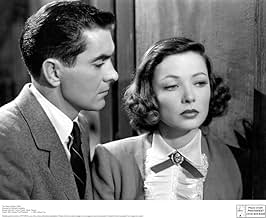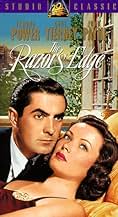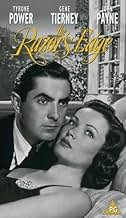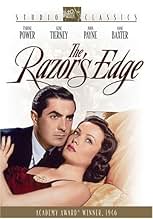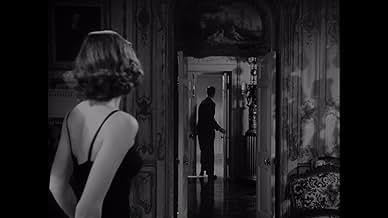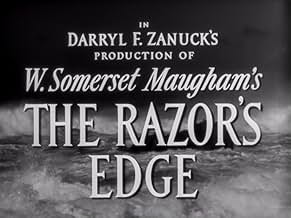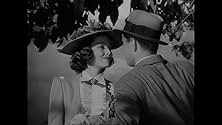IMDb-BEWERTUNG
7,3/10
7180
IHRE BEWERTUNG
Füge eine Handlung in deiner Sprache hinzuAn adventuresome young man goes off to find himself and loses his socialite fiancée in the process. But when he returns 10 years later, she will stop at nothing to get him back, even though ... Alles lesenAn adventuresome young man goes off to find himself and loses his socialite fiancée in the process. But when he returns 10 years later, she will stop at nothing to get him back, even though she is already married.An adventuresome young man goes off to find himself and loses his socialite fiancée in the process. But when he returns 10 years later, she will stop at nothing to get him back, even though she is already married.
- Regie
- Drehbuch
- Hauptbesetzung
- 1 Oscar gewonnen
- 6 Gewinne & 3 Nominierungen insgesamt
Dorothy Abbott
- Showgirl
- (Nicht genannt)
George Adrian
- Party Guest
- (Nicht genannt)
Demetrius Alexis
- Abbe
- (Nicht genannt)
Olga Andre
- Minor Role
- (Nicht genannt)
John Ardell
- Banker
- (Nicht genannt)
Frank Arnold
- Miner
- (Nicht genannt)
- …
Juan Arzube
- Minor Role
- (Nicht genannt)
Empfohlene Bewertungen
W Somerset Maugham's is a character in his own "The Razor's Edge". He's played by Herbert Marshall and he's given the hardest lines to deliver: "He looks extraordinarily happy, calm yet aloof" He's talking about Larry, Tyrone Power's character, after his enlightening trip to India. Power returns and reintroduces himself in the life of Isabel, played by the impossibly beautiful Gene Tirney. The world that Powers discovers in India will give this all consuming melodrama a spiritual tinge. Edmund Goulding choreographs the unfolding with surprising results. Tirney's beauty permeates the whole film and her character is as truthful as it is cruel although she doesn't mean to be neither truthful nor cruel. Anne Baxter as the tragic Sophie gets an Academy Award while Clifton Webb camps it out shamelessly. Loved the scene of the coin and John Payne's headache. Gene Tirney's reaction to Tyrone Power, as he works the "miracle", is the best acting of her entire career. Deserves to be seen.
Producer Darryl F. Zanuck fashioned a major production for Tyrone Power upon his return to 20th Century Fox after a stint in the military service. No expense was spared in terms of production values, and special care was taken to cast each role to "perfection."
With master story teller W. Somerset Maugham joining in writing the screenplay from his sprawling, multi-character novel, and Edmund Gouling doing the direction and Alfred Newman the score, it was a setup that couldn't miss.
The cast works at a thoroughly respectable level, and the film emerges likewise. Yet, it falls strangely short of the genuine masterpiece Zanuck obviously planned.
There is a rather cold center to "The Razor's Edge," which prevents one from being able to completely empathize with and feel for these characters and their respective plight. While they are interesting, the characters fail to ignite a deep emotional response in the viewer. One ends more observing this enactment, which has the feel of a somewhat slick presentation.
It also represents the best of what 20th Century Fox had to offer in the mid-forties. Power next went on to do "Nightmare Alley," for which he received some of the best notices of his lengthy film career.
With master story teller W. Somerset Maugham joining in writing the screenplay from his sprawling, multi-character novel, and Edmund Gouling doing the direction and Alfred Newman the score, it was a setup that couldn't miss.
The cast works at a thoroughly respectable level, and the film emerges likewise. Yet, it falls strangely short of the genuine masterpiece Zanuck obviously planned.
There is a rather cold center to "The Razor's Edge," which prevents one from being able to completely empathize with and feel for these characters and their respective plight. While they are interesting, the characters fail to ignite a deep emotional response in the viewer. One ends more observing this enactment, which has the feel of a somewhat slick presentation.
It also represents the best of what 20th Century Fox had to offer in the mid-forties. Power next went on to do "Nightmare Alley," for which he received some of the best notices of his lengthy film career.
Old Hollywood was always in trouble when dealing with Deep Think. That's because of the medium's commercial nature. When flirting with spiritual or religious beliefs, the studios simply didn't want to risk offending potential ticket buyers. So, when dealing with Deep Think (not their many biblical epics which were unabashedly Christian), the studios compromised to the point of absurdity by either flattening out the message or trivializing it. Here it's trivialized. After all, who's against Goodness. As a result, we wait 145-minutes to find out that, yes, Goodness is in fact a good and noble thing, and with that, Larry (Power) is on his way to enlightenment. And naturally, no one's offended, except maybe those who had expected something more.
Of course, the profundity is wrapped in lavishly mounted studio soap opera, with two of Hollywood's most beautiful people surrounded by whirling hosts of well-clothed extras. In fact, that opening ballroom scene is a marvel of orchestrated staging as the characters are introduced by serially playing off one another.
At the spectrum's other end, however, is that dreadful monastery scene with its painted mountain backdrop and facile dialog. Flattening the import of that pivotal scene are the repeated references to god as though that's where all paths must inevitably lead. And that's along with the spectacular alpine vistas fairly shouting celestial light from a heavenly above. I'm sure all that window dressing comforted nervous audiences who could then wink at Larry's spiritual quest and not feel the least bit threatened. But it also reduced a profound subject to a superficial level.
Another area that gets a Hollywood treatment are values and class, always tricky topics for an industry backed by Wall Street. The movie goes to pains circulating Larry among the gilded elite of Chicago as epitomized by the petulantly snobbish Templeton (Webb) and the selfishly insulated Isabel (Tierney). But, the elite's values are clearly materialistic, a spiritual dead-end in Larry's view as he heads off to learn from suffering with the working class. The screenplay thus sets up an implicit critique of the gilded class and the values that guide them. Well and good. But then the screenwriters can't seem to decide what to do with this point of view; after all, that's another touchy topic among audiences, especially coming so soon after the societal upheaval of the 1930's.
As a result, Larry never really criticizes the peer group he's been a part of, never really explains, that is, why he sees his social class as a spiritual dead-end, which of course would delve into a socially touchy subject. Nor, for that matter, does Larry explain why "salvation" lies through sharing a working class experience. We're left, I guess, to suppose the answer has to do with the suffering caused by hard physical labor and poor pay this class must endure. This subtext, however, is never really brought to the surface and remains unresolved at movie's end. Thus, big studio TCF and its head honcho, producer Zanuck, nibble around a second tinderbox topic, tantalizing us but never really delivering.
The movie does have a definite upside. For one, it's exquisitely well photographed, compensating somewhat for the 2-hour-plus run time. At the same time, the ballroom scenes are especially well choreographed and lavishly upholstered, creating an impressive air of wealth and breeding that makes Larry's renunciation a genuine material sacrifice. Then too, there's Webb's lively version of an unregenerate snob, a character he could do to waspish perfection. Also, Marshall's quietly observant author provides a needed contemplative note. However, in the film's pivotal role Power fails to provide the needed depth his character requires, or as another reviewer observes, Larry is pretty much the same after his trip to India as he was before. Fortunately, Power would later find that depth in Nightmare Alley (1947).
All in all, the movie remains an overlong visual treat that fortunately includes the exquisite Tierney. But as one might expect from old Hollywood, the film fails crucially at coming to grips with its two overriding themes—spirituality and class. As a result, two of life's most important questions are given unchallenging treatment. In short, here as elsewhere, where Deep Think is concerned, commercialism precedes all else.
Of course, the profundity is wrapped in lavishly mounted studio soap opera, with two of Hollywood's most beautiful people surrounded by whirling hosts of well-clothed extras. In fact, that opening ballroom scene is a marvel of orchestrated staging as the characters are introduced by serially playing off one another.
At the spectrum's other end, however, is that dreadful monastery scene with its painted mountain backdrop and facile dialog. Flattening the import of that pivotal scene are the repeated references to god as though that's where all paths must inevitably lead. And that's along with the spectacular alpine vistas fairly shouting celestial light from a heavenly above. I'm sure all that window dressing comforted nervous audiences who could then wink at Larry's spiritual quest and not feel the least bit threatened. But it also reduced a profound subject to a superficial level.
Another area that gets a Hollywood treatment are values and class, always tricky topics for an industry backed by Wall Street. The movie goes to pains circulating Larry among the gilded elite of Chicago as epitomized by the petulantly snobbish Templeton (Webb) and the selfishly insulated Isabel (Tierney). But, the elite's values are clearly materialistic, a spiritual dead-end in Larry's view as he heads off to learn from suffering with the working class. The screenplay thus sets up an implicit critique of the gilded class and the values that guide them. Well and good. But then the screenwriters can't seem to decide what to do with this point of view; after all, that's another touchy topic among audiences, especially coming so soon after the societal upheaval of the 1930's.
As a result, Larry never really criticizes the peer group he's been a part of, never really explains, that is, why he sees his social class as a spiritual dead-end, which of course would delve into a socially touchy subject. Nor, for that matter, does Larry explain why "salvation" lies through sharing a working class experience. We're left, I guess, to suppose the answer has to do with the suffering caused by hard physical labor and poor pay this class must endure. This subtext, however, is never really brought to the surface and remains unresolved at movie's end. Thus, big studio TCF and its head honcho, producer Zanuck, nibble around a second tinderbox topic, tantalizing us but never really delivering.
The movie does have a definite upside. For one, it's exquisitely well photographed, compensating somewhat for the 2-hour-plus run time. At the same time, the ballroom scenes are especially well choreographed and lavishly upholstered, creating an impressive air of wealth and breeding that makes Larry's renunciation a genuine material sacrifice. Then too, there's Webb's lively version of an unregenerate snob, a character he could do to waspish perfection. Also, Marshall's quietly observant author provides a needed contemplative note. However, in the film's pivotal role Power fails to provide the needed depth his character requires, or as another reviewer observes, Larry is pretty much the same after his trip to India as he was before. Fortunately, Power would later find that depth in Nightmare Alley (1947).
All in all, the movie remains an overlong visual treat that fortunately includes the exquisite Tierney. But as one might expect from old Hollywood, the film fails crucially at coming to grips with its two overriding themes—spirituality and class. As a result, two of life's most important questions are given unchallenging treatment. In short, here as elsewhere, where Deep Think is concerned, commercialism precedes all else.
I discovered this movie only recently and have watched it three times in the last two months. It's the kind of movie that rewards repeated viewings. The story, as others have commented, is moving and inspiring and way ahead of its time, dealing as it does with topics (the philosophical/spiritual quest for meaning in life, alcoholism, psychic healing, class divisions, post-war trauma, greed vs. self sacrifice) that one would expect in a movie taking place in the nineteen sixties rather than one taking place immediately following World War I. It offers the pleasure of Hollywood glamour of a very high order with one spectacular set-piece after another. Over and over, one is amazed at the staging of scenes set at balls, restaurants, night-clubs, Paris streets, factories, etc. Many jaw-dropping, pre-steadycam long takes involve the choreography of dozens of elements, e.g. one long take outside a Paris railway station, or another crane shot in a Paris night club as the camera searches the crowd for the protagonists. Everyone involved with the film seems to be working at his or her peak, from director Goulding to composer Alfred Newman, to all the perfectly cast actors. The screenplay is filled with brilliant cinematic story-telling devices (ironic voice-overs, montage sequences, foreshadowings, symbolism (the use of water and the ocean in so many scenes)that keep a long and complex story moving so smoothly that the two-hour-plus running time is hardly noticed at all. The cinematography by someone named Arthur Miller is gorgeous with lighting effects and moving camerawork that rank in the pantheon of Hollywood's visual creations. This is a great film.
British storyteller W(illiam) Somerset Maugham's 1944 speculative novel "The Razor's Edge," as did his earlier semi-autobiographical "Of Human Bondage," won a devoted following when it hit the book shelves, and so 20th Century-Fox wasted no time in securing the screen rights to this mammoth war-era adventure into existentialism. It was a difficult, elephantine undertaking but they somehow managed to carve out a screenplay and present the whole package within two years of the novel's first print.
Awesomely produced and directed, the resulting movie, for the most part, propels Maugham's central theme -- that there is good and bad in all human beings. The focus centers in on the long, spiritual quest of Larry Durrell, a basically virtuous individual who, surrounded by wealth, beauty and privilege, abandons his enviable but superficial trappings to pursue a more humble, meaningful life. Oddly enough, it's the superficial elements of the story and the more pretentious characters that hold up "The Razor's Edge," while the spiritual scenes grow flat and weary, often times stopping the action dead in its tracks.
In casting Tyrone Power as the protagonist, one finds THE major flaw in its presentation. Tagged as a pretty boy for most of his career, he managed to show only glimpses of dramatic aptitude from time to time ("Witness for the Prosecution" comes to mind). Earnest and utterly sincere in his approach, Power simply lacks the power (sorry) and the depth to carry off this complex, confused, anachronistic soul-searcher. His Durrell seems better suited amongst the shallow and superficial. One only wonders what a Robert Donat or Fredric March might have done with such a role.
Surrounding Power, however, is a stellar list of names that gussies up this production, and it is in them that we find the film's emotional impact. In particular, Gene Tierney offers one of her finest performances as Isabel, the grasping, captivating socialite obsessed with Durrell, who shows her true colors in the end when goodness and all else fails to win her the love of a man. Like Power, Tierney is a flawless, incredibly photogenic beauty who tended toward posturing instead of acting. Here she is allowed to capitalize on her tendency towards elegant frippery, offering a cool, intriguing portrait of a woman who can and will never have enough.
We are also blessed with the presence of Clifton Webb, the epitome of smug elegance, who is true to form here as the meticulous, wasp-tongued prig who is not use to being told "no." As in the classic "Laura," Webb is handed the film's most delicious lines as his character goes about buffering his unhappiness with scorn and witty sarcasm. He would warm over this character recipe many times in movies, but darned if you don't keep going back for second helpings. He is delightfully hateful and absolutely mesmerizing. Anne Baxter as the helpless, tragic Sophie is heart-wrenching, giving a florid, Oscar-winning performance that lingers long after the final reel. She, not Power, is the heart and ravaged soul of this piece. The hospital scene following her horrific accident will rip you apart, as will her subsequent degradation into alcohol and prostitution. Known for her flashy, theatrical roles, Baxter plays Sophie for all its worth.
John Payne is typically upright and appealing and does what he can in a rather stiff, thankless "other man" part, while suave Herbert Marshall, who, in reality, lost a leg in WWI but continued to act (often in a chair), portrays Maugham himself with customary flair.
Granted, "The Razor's Edge" is no "Lost Horizon" in the metaphysical department, but on its own it is quite admirable and engrossing entertainment. It manages to hold up exceedingly well under its great length and weight, feels only slightly dated, and prides itself with gorgeous production values and a handsome, handsome cast.
Awesomely produced and directed, the resulting movie, for the most part, propels Maugham's central theme -- that there is good and bad in all human beings. The focus centers in on the long, spiritual quest of Larry Durrell, a basically virtuous individual who, surrounded by wealth, beauty and privilege, abandons his enviable but superficial trappings to pursue a more humble, meaningful life. Oddly enough, it's the superficial elements of the story and the more pretentious characters that hold up "The Razor's Edge," while the spiritual scenes grow flat and weary, often times stopping the action dead in its tracks.
In casting Tyrone Power as the protagonist, one finds THE major flaw in its presentation. Tagged as a pretty boy for most of his career, he managed to show only glimpses of dramatic aptitude from time to time ("Witness for the Prosecution" comes to mind). Earnest and utterly sincere in his approach, Power simply lacks the power (sorry) and the depth to carry off this complex, confused, anachronistic soul-searcher. His Durrell seems better suited amongst the shallow and superficial. One only wonders what a Robert Donat or Fredric March might have done with such a role.
Surrounding Power, however, is a stellar list of names that gussies up this production, and it is in them that we find the film's emotional impact. In particular, Gene Tierney offers one of her finest performances as Isabel, the grasping, captivating socialite obsessed with Durrell, who shows her true colors in the end when goodness and all else fails to win her the love of a man. Like Power, Tierney is a flawless, incredibly photogenic beauty who tended toward posturing instead of acting. Here she is allowed to capitalize on her tendency towards elegant frippery, offering a cool, intriguing portrait of a woman who can and will never have enough.
We are also blessed with the presence of Clifton Webb, the epitome of smug elegance, who is true to form here as the meticulous, wasp-tongued prig who is not use to being told "no." As in the classic "Laura," Webb is handed the film's most delicious lines as his character goes about buffering his unhappiness with scorn and witty sarcasm. He would warm over this character recipe many times in movies, but darned if you don't keep going back for second helpings. He is delightfully hateful and absolutely mesmerizing. Anne Baxter as the helpless, tragic Sophie is heart-wrenching, giving a florid, Oscar-winning performance that lingers long after the final reel. She, not Power, is the heart and ravaged soul of this piece. The hospital scene following her horrific accident will rip you apart, as will her subsequent degradation into alcohol and prostitution. Known for her flashy, theatrical roles, Baxter plays Sophie for all its worth.
John Payne is typically upright and appealing and does what he can in a rather stiff, thankless "other man" part, while suave Herbert Marshall, who, in reality, lost a leg in WWI but continued to act (often in a chair), portrays Maugham himself with customary flair.
Granted, "The Razor's Edge" is no "Lost Horizon" in the metaphysical department, but on its own it is quite admirable and engrossing entertainment. It manages to hold up exceedingly well under its great length and weight, feels only slightly dated, and prides itself with gorgeous production values and a handsome, handsome cast.
Wusstest du schon
- WissenswertesThere were 89 different sets built for the film, which had the longest shooting schedule for any film at the studio to that date. According to some news items, the film broke all previous studio box office records.
- PatzerAfter a promising beginning, in which the clothes and hairstyles of 1919 are pleasantly and reasonably accurately interpreted, as soon as it gets to 1920, then on to 1930, and beyond, Gene Tierney's hairstyle is in an unchanging, although very attractive, 1946 mode, and all of her clothes, designed by husband Oleg Cassini, except for lower hemlines, are strictly 1946, complete with the ubiquitous shoulder pads of that era. Anne Baxter's ensembles look more like Tierney/Cassini rejects, an unhappy compromise between opposing styles.
- Crazy CreditsWhen the screenplay credits are shown, a curious symbol appears near W. Somerset Maugham's name. It's a symbol meant to ward off the evil eye, and it more often than not appeared on the covers of many of Maugham's novels.
- VerbindungenFeatured in 50 Jahre 20th Century Fox (1997)
Top-Auswahl
Melde dich zum Bewerten an und greife auf die Watchlist für personalisierte Empfehlungen zu.
- How long is The Razor's Edge?Powered by Alexa
Details
- Erscheinungsdatum
- Herkunftsland
- Sprachen
- Auch bekannt als
- El filo de la navaja
- Drehorte
- Denver, Colorado, USA(2nd unit exteriors, backgrounds, mountains)
- Produktionsfirma
- Weitere beteiligte Unternehmen bei IMDbPro anzeigen
Box Office
- Budget
- 1.200.000 $ (geschätzt)
- Laufzeit
- 2 Std. 25 Min.(145 min)
- Farbe
- Seitenverhältnis
- 1.33 : 1
Zu dieser Seite beitragen
Bearbeitung vorschlagen oder fehlenden Inhalt hinzufügen

